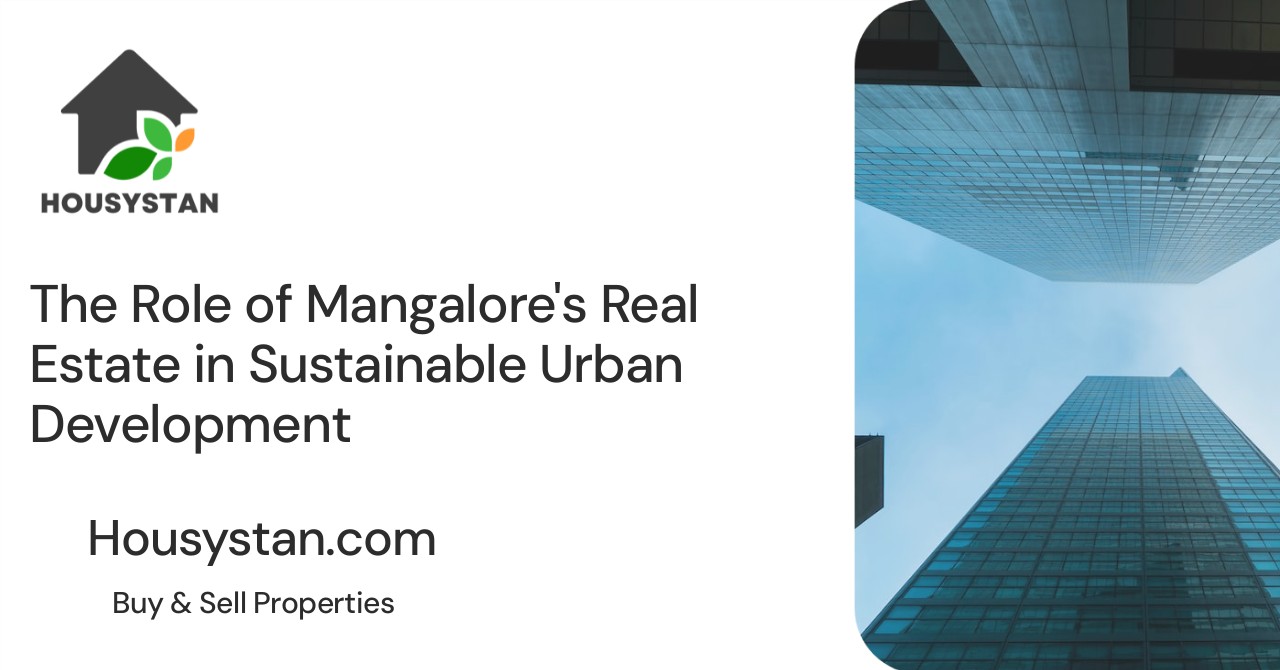The Role of Mangalore's Real Estate in Sustainable Urban Development
Read latest blogs and articles from Housystan

The Information mentioned here was last updated on:
18/2/2026The Role of Mangalore’s Real Estate in Sustainable Urban Development
Introduction: Urban Growth and Sustainability in Mangalore
Mangalore, a bustling port city on India’s southwestern coast, is undergoing rapid transformation. With its growing population, economic activities, and infrastructure projects, Mangalore’s real estate market is expanding at an unprecedented rate. But as the city grows, so does the need for sustainable urban development. The real estate sector, a significant driver of this growth, plays a crucial role in shaping Mangalore’s future, ensuring that progress does not come at the expense of the environment and quality of life.
- Verified Tenants/Buyers
- Unlimited Property Listing
- Zero subscription/charges fee
Mangalore’s Real Estate Boom: Factors Fueling Expansion
The demand for residential, commercial, and industrial properties in Mangalore has soared in recent years. Several key factors contribute to this surge:
1. Strategic Location and Connectivity
Mangalore’s strategic location as a gateway to Karnataka’s coastal belt, combined with robust road, rail, and air connectivity, has made it an attractive destination for investors and homebuyers alike.
2. Economic Diversification
The city’s economy is no longer limited to traditional sectors like fishing and agriculture. The rise of IT parks, educational institutions, and healthcare facilities has generated new jobs, increasing the need for quality housing and office spaces.
3. Influx of Migrants and Urbanization
As more people move to Mangalore in search of better opportunities, the pressure on urban infrastructure grows. This influx drives the demand for sustainable, well-planned real estate projects that can accommodate the city’s diverse population.
Challenges in Balancing Growth and Sustainability
While the real estate boom brings prosperity, it also presents unique challenges. Unplanned urban expansion can lead to environmental degradation, traffic congestion, water scarcity, and loss of green spaces. Mangalore’s coastal ecosystem, which includes rivers, estuaries, and mangrove forests, is particularly vulnerable.
Developers, city planners, and policymakers must prioritize sustainable practices to ensure that economic growth does not compromise ecological balance. This responsibility has become central to the future of Mangalore’s real estate sector.
Sustainable Urban Development: What Does It Mean?
Sustainable urban development refers to the design and construction of cities that promote economic prosperity, social equity, and environmental protection. In real estate, this means adopting green building standards, conserving resources, integrating renewable energy, and creating inclusive communities.
Globally, the United Nations’ Sustainable Development Goals (SDGs) serve as a blueprint. For Mangalore, aligning real estate practices with these goals is essential to ensure long-term viability and resilience against climate change.
Green Building Initiatives in Mangalore
Leading developers in Mangalore are increasingly embracing green building concepts. These initiatives include:
Smart Urban Planning: The Path Forward
Urban planners in Mangalore are increasingly focused on creating mixed-use developments that combine housing, workspaces, and recreational areas. This approach reduces commute times, eases traffic congestion, and promotes healthier lifestyles.
Transit-oriented development—where real estate projects are located close to public transportation hubs—encourages residents to use buses and trains instead of private vehicles, reducing air pollution and carbon emissions. Walkable neighborhoods, cycle-friendly infrastructure, and open spaces are also becoming central features in new real estate projects.
Inclusive Housing: Meeting the Needs of All Residents
Sustainable urban development is not just about the environment—it’s about people too. Mangalore’s real estate sector is working to create affordable housing options for all income groups. Government initiatives, such as the Pradhan Mantri Awas Yojana (PMAY), are being actively implemented, ensuring that even low- and middle-income families can own homes in healthy, safe environments.
Inclusive housing projects often incorporate community centers, playgrounds, and basic healthcare facilities, fostering a sense of belonging and social cohesion among residents.
Technology and Innovation: Transforming Real Estate in Mangalore
The integration of technology is revolutionizing how real estate projects are planned, built, and managed. Smart buildings equipped with IoT-based systems can monitor energy usage, optimize lighting and temperature controls, and enhance security. Digital platforms streamline property transactions, making the buying and selling processes more transparent and efficient.
Furthermore, the use of Geographic Information Systems (GIS) aids in accurate site selection, environmental impact assessments, and disaster risk management—key elements in sustainable urban planning.
Community Involvement: The Human Element in Urban Development
Sustainable development thrives when local communities are involved in the planning process. In Mangalore, residents’ associations, NGOs, and citizen groups are working alongside developers and government officials to voice concerns, suggest improvements, and ensure that projects reflect the true needs and aspirations of the people.
Community-driven urban development leads to better-maintained public spaces, safer neighborhoods, and a stronger sense of ownership among residents.
Policy Support and Future Prospects
The Karnataka state government and Mangalore City Corporation are enacting policies that incentivize green building, promote affordable housing, and regulate land use. Environmental Impact Assessments (EIA) are mandatory for large projects, ensuring thorough scrutiny before approval. Financial incentives, such as tax breaks and reduced permit fees, are encouraging developers to adopt sustainable practices.
Looking ahead, Mangalore’s real estate sector is poised for responsible growth. As climate change and urbanization continue to shape the city’s trajectory, sustainable urban development will remain a core objective, balancing the needs of people, profit, and the planet.
Conclusion: Building a Greener, More Inclusive Mangalore
Mangalore’s real estate industry stands at a crossroads—its choices today will determine the quality of life for future generations. By embracing sustainable urban development, the city can enjoy economic prosperity while preserving its unique coastal ecosystem and cultural heritage. Collaboration among developers, policymakers, and residents will be key in transforming Mangalore into a model for sustainable cities across India and beyond.